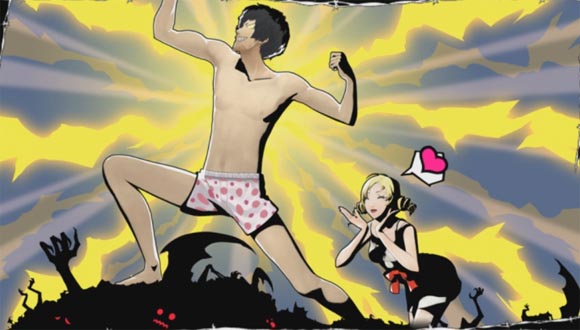I recently finished Catherine. At least I declared for me I did. Normally, I would attempt to get at least the majority of the achievements. But after witnessing all the endings, I decided to draw the line. The Babel challenges turned out to be a painfully difficult even on the easiest stage. The babel mini game was amusing but at 64 stages, it’s overstayed it’s welcome well before I could get trough them all.

Nothing to gloat about.
As much as I liked the idea of Catherine, the actual game failed to deliver on it’s premise in many ways. The refreshingly serious topic is treated in disappointingly shallow way. It depicts women as well as men in a single-minded fashion. The resolution of the conflict is left to super-natural phenomena rather than to consequences of actual character development. The puzzle gameplay is almost completely divorced from the narrative. What’s worse, the game concentrates on the gameplay a lot. And that’s precisely what is least engaging about Catherine.
I also wanted to mention the endings as an extension of what I already wrote about. For some reason, multiple endings are still this wicked beast that no developer seems to have tamed yet. Catherine is no different. There are 8 different endings. They can be divided into 3 types: “Catherine”, “Katherine” and “Freedom”. Each type has a “Bad”, “Good” and “True” variant (with one exception: “Freedom Bad” is missing). And really, if you think about it, there is only one ending worth having:
-
Katherine Endings were probably the most satisfying ones. They all show Vincent explaining the situation to Katherine and asking for a second chance. Surprisingly, I found the “Katherine Good” ending emotionally more effective than the supposedly more desirable “Katherine True”. In the good ending, you see a glimpse Katherine and Vincent having a pleasant, more natural interaction. Throughout the game, Vincent is having a perpetual “we need to talk” situation with Katherine. Katherine herself seems like a very unpleasant, stuck-up character. The good ending alleviates this to some extent which feels cathartic. The “Katherine True” ending does resolve a major mystery about a supporting character so it’s nice too. The “Katherine Bad” is just shit tough. Katherine dumps Vincent. Congratulations, you just wasted 15 hours.
-
Catherine Endings are the comedy endings. No matter if bad, good or true, they are all supposed to be funny. The “Catherine True” ending is perhaps the most wacky ending in the game. The problem with them is that Catherine is not a particularly funny game. The topics in the game seem rather serious in nature. There are some humorous moments but the conflict at the story’s core a mature one. So having a wacky comedy ending seems just dishonest and unsatisfying.
-
Freedom Endings are for the middle ground. You get these if you haven’t maxed out your freedom vs law meter in either direction or if you answered the final questions in an ambiguous manner. They depict Vincent transcending the conflict and just ignoring both women. Like the comedy endings, they feel dishonest. The entire game is hammering the Catherine vs. Katherine dilemma after all. It begs for a proper resolution. To add insult to injury, if you answer the questions in an honest fashion you are bound to end up somewhere in between. Relationships are a complicated thing with multiple viewpoints after all. And especially by the end, even the questions themselves outgrow the simple-minded law/freedom dichotomy. “Is it easier to love, or be loved?” or “Which is harder: lying or being lied to?”. If you care about the questions you won’t max out your score either way. And that’s where the game delivers you the lazy cop out ending.
Catherine is a good way to learn from because it is so broken in so many ways. The law/freedom dichotomy favors min/max grinding rather than emotional involvement. The endings reflect that and the OCD treatment of gameplay echoes the idea. The endings also betray that the game’s wasn’t actually written with multiple endings in mind. All the dozens of choices you make in the game all boil down to 1 or 2 genuinely satisfying endings that really feel like a good story arc. The rest of the outcomes seem an afterthought. And with that, I think it’s fair to file Catherine as a interesting case of not living up to it’s own premise on multiple levels.






Hey, I saw your review while searching through random webpages. I know it’s pretty old so I don’t know if you will see this comment, but I thought your review was almost spot-on. I also feel like the creators took an extremely mature subject and then gave it an immature treatment. You are right that none of the characters is as complex or realistic as they should be. This is also the case in Personas 3 and 4 where the characters are not truly realistic or multi-faceted. Perhaps you could point me to a game that does have realistic characters though. I will admit I know next to nothing about modern games having stopped playing them 3 years ago (real life took over!) I will say that in my opinion Vincent was the most realistic, as I saw myself and many other men I knew in his thoughts and actions. I also was dating a woman named Katherine who acted exactly like the Katherine in the game, at the same time I was playing the game. Maybe this game is not like a good book or movie, but I feel the writing is better than most games I’ve played.
I also thought the moral choices were stupid and too easy to “game” to get the best ending. A better way would have been to have an invisible meter that depended on your in-game actions. Again, I say this having not played the Mass Effect series or any other modern games, so my opinion may be way off. Anyway, thanks for the great review!